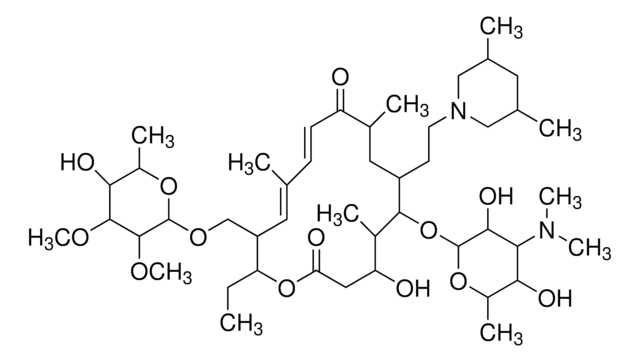34859
Hexane
≥97.0% (GC), suitable for HPLC, suitable for EPA 1613, EPA ACB B21-02, EPA OTM-45, and EPA ACB B23-05b
Synonym(s):
n-Hexane
About This Item
Recommended Products
product name
Hexane, suitable for HPLC, ≥97.0% (GC)
Agency
suitable for EPA 1613
suitable for EPA ACB B21-02
suitable for EPA ACB B23-05b
suitable for EPA OTM-45
vapor density
~3 (vs air)
vapor pressure
256 mmHg ( 37.7 °C)
5.2 psi ( 37.7 °C)
~132 mmHg ( 20 °C)
Assay
≥97.0% (GC)
form
liquid
autoignition temp.
453 °F
expl. lim.
7.7 %
technique(s)
HPLC: suitable
impurities
≤0.0005% non-volatile matter
≤0.001% free acid (as CH3COOH)
≤0.01% water (Karl Fischer)
evapn. residue
≤0.0005%
transmittance
200 nm, ≥20%
225 nm, ≥80%
250 nm, ≥98%
refractive index
n20/D 1.375 (lit.)
pH
7
bp
69 °C (lit.)
mp
−95 °C (lit.)
density
0.659 g/mL at 25 °C (lit.)
λ
H2O reference
UV absorption
λ: 200 nm Amax: ≤0.70
λ: 225 nm Amax: ≤0.10
λ: 250 nm Amax: ≤0.01
application(s)
food and beverages
SMILES string
CCCCCC
InChI
1S/C6H14/c1-3-5-6-4-2/h3-6H2,1-2H3
InChI key
VLKZOEOYAKHREP-UHFFFAOYSA-N
Looking for similar products? Visit Product Comparison Guide
Related Categories
Application
- Comparative Study of Gas and Liquid Chromatography Methods for the Determination of Underivatised Neutral and Acidic Cannabinoids and Cholesterol.: This research highlights the essential role of hexane in gas and liquid chromatography for analyzing complex mixtures in pharmaceuticals and clinical diagnostics, demonstrating its critical application in high-precision analytical methods (Czauderna et al., 2024).
- In Vitro Antioxidant and In Silico Evaluation of the Anti-β-Lactamase Potential of the Extracts of Cylindrospermum alatosporum NR125682 and Loriellopsis cavenicola NR117881.: This study employs hexane to extract bioactive compounds with potential antioxidant and antibacterial activities, showcasing its importance in novel drug discovery and antimicrobial resistance research (Ikhane et al., 2024).
- Exploration of reducing and stabilizing phytoconstituents in Arisaema dracontium extract for the effective synthesis of Silver nanoparticles and evaluation of their antibacterial and toxicological properties.: Demonstrates the use of hexane in the synthesis of nanoparticles, indicating its utility in nanotechnology and its impact on enhancing antibacterial properties of phytoconstituents (Khattak et al., 2024).
- Production and Physicochemical Characterization of the Gel Obtained in the Fermentation Process of Blue Corn Flour (Zea mays L.) with Colletotrichum gloeosporioides.: Focuses on the physicochemical properties of gels influenced by hexane extraction, pertinent to food science and material engineering (Villarreal-Rodríguez et al., 2024).
- Cloning, Expression, Characterization and Immobilization of a Recombinant Carboxylesterase from the Halophilic Archaeon, Halobacterium salinarum NCR-1.: This study involves hexane in the process of enzyme immobilization, highlighting its role in enhancing enzyme stability and activity, crucial for biotechnological applications (Ortega-de la Rosa et al., 2024).
Other Notes
- The article number 34859-4X2.5L will be discontinued. Please order the single bottle 34859-2.5L which is physically identical with the same exact specifications.
- The article number 34859-6X1L will be discontinued. Please order the single bottle 34859-1L which is physically identical with the same exact specifications.
Signal Word
Danger
Hazard Statements
Precautionary Statements
Hazard Classifications
Aquatic Chronic 2 - Asp. Tox. 1 - Flam. Liq. 2 - Repr. 2 - Skin Irrit. 2 - STOT RE 2 Inhalation - STOT SE 3
Target Organs
Central nervous system, Nervous system
Storage Class Code
3 - Flammable liquids
WGK
WGK 3
Flash Point(F)
-7.6 °F - closed cup
Flash Point(C)
-22 °C - closed cup
Certificates of Analysis (COA)
Search for Certificates of Analysis (COA) by entering the products Lot/Batch Number. Lot and Batch Numbers can be found on a product’s label following the words ‘Lot’ or ‘Batch’.
Already Own This Product?
Find documentation for the products that you have recently purchased in the Document Library.
Customers Also Viewed
Related Content
This page is intended to make it easier to find the consumables you need based on the analytical method you’re using. Methods included on this page come from the EPA, Standard Methods and ASTM.
This page is intended to make it easier to find the consumables you need based on the analytical method you’re using. Methods included on this page come from the EPA, Standard Methods and ASTM.
This page is intended to make it easier to find the consumables you need based on the analytical method you’re using. Methods included on this page come from the EPA, Standard Methods and ASTM.
This page is intended to make it easier to find the consumables you need based on the analytical method you’re using. Methods included on this page come from the EPA, Standard Methods and ASTM.
Our team of scientists has experience in all areas of research including Life Science, Material Science, Chemical Synthesis, Chromatography, Analytical and many others.
Contact Technical Service










